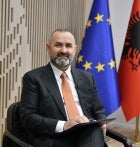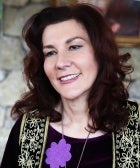Breadcrumb
Stories
Topic
- Show all (1276)
- Civil society (-) (12)
- Social protection (-) (8)
- Rule of law (-) (4)
- Ending violence against women and girls (72)
- Gender equality and women’s empowerment (45)
- Anti-violence interventions (41)
- Gender discrimination (38)
- Gender equality and inequality (38)
- Domestic violence/interpersonal violence (36)
- Access to justice and legal protection (33)
- Legal assistance (29)
- Laws, legislation (26)
- Gender-responsive budgeting (24)
- Primary prevention (24)
- Sexual harassment (24)
- Feminicide/femicide (23)
- Service delivery (23)
- Economic empowerment (22)
- Rape/sexual assault (21)
- Employment (20)
- Shelters (20)
- Rural women (19)
- Entrepreneurship (18)
- Decision-making (16)
- Youth (16)
- Gender power relations (15)
- Women’s rights (15)
- COVID-19 (14)
- Financing for gender equality (13)
- Gender mainstreaming (13)
- Gender, culture and society (12)
- Men and boys (masculinity) (12)
- Political empowerment (12)
- Access to basic services (11)
- Adolescents (11)
- Businesses and foundations (11)
- Girls (11)
- Human rights (11)
- UNiTE campaign (11)
- Beijing Platform for Action (10)
- Civil society participation (10)
- Peace and security (10)
- Safe Cities and Safe Public Spaces (10)
- Training (10)
- Women with disabilities (10)
- Convention on the Elimination of All Forms of Discrimination against Women (CEDAW) (9)
- Financial resources (9)
- Information and communications technology (ICT) (9)
- Leadership and political participation (9)
- National planning (9)
- Partnerships (9)
- Gender stereotypes (8)
- Governance (8)
- Innovation and technology (8)
- Institutional mechanisms (8)
- Peacebuilding (8)
- Women farmers (8)
- Citizen engagement (7)
- Gender statistics (7)
- Generation Equality (7)
- Government contributors (7)
- Productive resources (7)
- Religion (7)
- Science and technology for development (7)
- Sports (7)
- Trafficking/sexual exploitation (7)
- Women’s movements (7)
- 2030 Agenda for Sustainable Development (6)
- Child marriage (6)
- Communications and media (6)
- Electoral systems and processes (6)
- Lesbian, gay, bisexual, transgender, intersex (LGBT) rights (6)
- Markets (6)
- Political violence (6)
- Sex-disaggregated data (6)
- Sustainable Development Goals (SDGs) (6)
- Unpaid work (6)
- Accountability (5)
- Gender data production and collection (5)
- Governance and national planning (5)
- Rural development (5)
- Traditional media (5)
- Constitutions and legal reform (4)
- Gender data gaps (4)
- Gender data use and accessibility (4)
- Gender wage gap (4)
- Health (4)
- Intergovernmental processes (4)
- Land and property (4)
- New media (4)
- Poverty (4)
- Public administration (4)
- Schooling (4)
- Accountability in the UN system (3)
- Climate change (3)
- Crisis response and recovery (3)
- Education (3)
- Environmental protection (3)
- Gender equality indicators (3)
- Health care services (3)
- Inheritance rights (3)
- Living conditions (3)
- Media leadership (3)
- National mechanisms (3)
- National statistical systems (3)
- Parliamentary development (3)
- UN Security Council resolution 1325 (3)
- UN system coordination (3)
- Capacity development (2)
- Coordination, knowledge management (2)
- Disaster risk reduction (2)
- Food security (2)
- Fundamental freedoms (2)
- Fund for Gender Equality (2)
- Harmful practices (2)
- Humanitarian action (2)
- Human rights–based approach (2)
- Macroeconomic policies (2)
- Monitoring and evaluation (2)
- Planning and monitoring (2)
- Sexual and reproductive health and rights (2)
- UN Security Council resolutions (2)
- Urban development (2)
- Åsa Regnér, Deputy Executive Director for Policy, Programme, Civil Society and Intergovernmental Support (1)
- Children’s rights (1)
- Commission on the Status of Women (1)
- Executive Director (1)
- Financial and economic crisis (1)
- Green economy (1)
- Literacy (1)
- Local development (1)
- Maternal health (1)
- Migration (1)
- Monitoring, evaluation and reporting (1)
- Peace processes (1)
- Public sector reform (1)
- Sexuality (1)
- Temporary special measures, affirmative action (1)
- UN Trust Fund to End Violence against Women (1)
Region
Country
1 - 20 of 24 Results
Pagination
Date:
UN Women, in partnership with the government, launched a three-year initiative to empower women in rural northern Albania by strengthening governance, promoting economic opportunities, and combating gender-based violence in Shkodër, Bulqizë, Malësi e Madhe, and Dibër.
Date:
As Albania celebrates three decades since the adoption of the Beijing Declaration, the country continues to make strides in gender equality. An inspiring intergenerational dialogue at a recent event brought together key stakeholders from the Ministry of Health and Social Protection, United Nations Albania, the EU Delegation, and other partners, alongside passionate feminist activists from all generations.
Date:
In this interview, Ulsi Manja, Minister of Justice of Albania, highlights the government's commitment to advancing gender equality through the justice system. He discusses the importance of gender-responsive budgeting, ongoing efforts to address the needs of women and girls, and key interventions such as free legal aid, humane conditions in penal institutions, and measures to combat gender-based violence.
Date:
The revision of Albania’s 2008 Gender Equality Law is underway, as a concrete action following recommendations received by the UN Committee on the rights of women (UN CEDAW).
Date:
A woman going to work is not a common sight in Prrenjas, a small town in Eastern Albania, about 100 km from the country’s capital. In this area, particularly among people living in villages, women often work the land or take care of their families, constrained by a lack of employment opportunities, limited public transport, and prevailing societal attitudes. Alketa Haxholli, however, has challenged this mindset.
Date:
A two-day workshop on gender participatory budgeting and community outreach practices brought together civil society organizations, local government representatives, activists, and gender-responsive budgeting experts from Albania and North Macedonia.
Date:
Verie Tahiraj is a strong and determined woman, who has been supporting her family through economic hardship for years. When the opportunity to secure a source of income by becoming a part of the artisan value chain presented itself, she seized it without hesitation.
Date:
Interview with Michele Ribotta, Head of the UN Gender Group and UN Women Representative in Albania
Date:
Women artisans engaged in the handicraft value chain and market now better equipped to earn higher incomes.
Date:
Aferdita Kote’s* old Nokia phone had only one contact: that of her husband of 10 years. He called her constantly to know her whereabouts. But she did not tell him when she got a new smartphone equipped with a mobile application (Bright Sky) to report violence.
Date:
Fabiola Laço Egro is the founder and leader of the “Today for the Future” Community Center as well as a member of National Council of Civil Society in Albania and the Monitoring Network against Gender-Based Violence. One of the most prominent civil society activists in Albania, Ms. Laço Egro shares her perspectives and lessons learned on building networks and alliances to advance the gender equality agenda.
Date:
The UN Women office in Albania teamed up with the government, civil society organizations, international partners, and other UN agencies operating in the country to mark this year's 16 Days of Activism against Gender-based Violence with a variety of public events, university lectures, trainings, social media campaigns and much more.
Date:
The Ministry of Health and Social Protection and UN Agencies in Albania launched the “16 Days of Activism against Gender-Based Violence” campaign supported by UN Women. The event brought together government and international partners, feminists, women’s rights activists, as well as many others who work every day to prevent and eliminate violence against women and girls.
Date:
The plans were adopted following broad-based and inclusive consultations with public and nonpublic institutions, the civil society, academia, youth, and private sector representatives. The entire process was technically supported by UN Women, as part of the Joint Programme “European Union for Gender Equality in Albania,” financed by the European Union through the Albania SDG Acceleration Fund.
Date:
More than ninety women and girls from four regions of Albania participated in a fair event organized by UN Women and supported by the Albanian Network for Rural Development. They discussed the challenges faced by women in the agri-food sector in the presence of representatives from the Ministry of Agriculture and Rural Development, the Italian Agency for Development Cooperation and Municipality of Elbasan officials.
Date:
Earlier this year, young Albanian activists got together and developed a “Call to youth-driven and gender responsive climate and environmental action in Albania,” with the support of UN Women Albania, the Tirana European Youth Capital and the Resource Environmental Centre (REC) Albania.
Date:
It will serve as a manifesto and will be circulated amongst institutions to push the climate and environmental justice agenda in Albania.
Date:
The Assistant Secretary-General of the United Nations and Deputy Executive Director of UN Women, Åsa Regnér, visited Albania to meet with high level government representatives, civil society organizations and international partners.
Date:
UN Women, in collaboration with the Municipality of Tirana and the OSCE Presence in Albania, organized a Youth Forum on Gender Equality, Climate Change and the Environment, in the context of celebrating Tirana as the 2022 European Youth Capital.
Date:
Klodiana Mere* has more than 30 stitches on her head, the same number as the number of years she lived in terror of her life and the lives of her two children. She survived a deadly attack by her ex-husband four years ago but the agony did not end there.
1 - 20 of 24 Results















